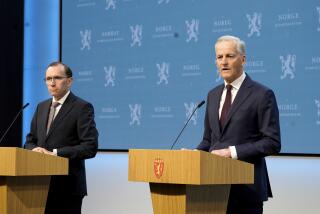PLO Faction Rejects Israel Recognition
- Share via
RAMALLAH, Israeli-Occupied West Bank — A radical faction of the Palestine Liberation Organization has come out against the group’s implicit recognition of Israel and efforts to tone down the Arab uprising in the occupied West Bank and Gaza Strip.
The faction, called the Popular Front for the Liberation of Palestine, is circulating its written objections among followers in the occupied territory. In a clear display of insubordination, the PFLP ordered two days of commercial strikes not authorized by the Unified National Leadership for the Uprising in the Occupied Territories, the clandestine, PLO-allied coordinator of the rebellion.
Compromise Opposed
The pamphlets exposed the second known fissure among Arab groups in the West Bank and Gaza since the PLO declared an independent state Nov. 15. Muslim fundamentalists also have circulated calls to oppose any compromise that would leave the state of Israel intact.
The PFLP statement is more significant because the faction has taken an active role in the uprising and is extremely well organized, Arab sources said Saturday. The split threatens the rare unity among the Palestinians in their 11-month old intifada, or uprising, against Israeli rule, they added.
It may also be a political embarrassment for PLO leader Yasser Arafat, who has gone out on a limb by pressing for recognition of Israel.
“Why are we kneeling down before our state is created and while our enemy . . . is not willing to withdraw from any inch of it?” the PFLP pamphlet asked.
“We have a long road ahead of us and many sacrifices to make and the most important means we have is the intifada. We have to keep it going and its flames lit and swords shining,” it continued.
The PLO declared an independent state at a meeting in Algiers of the Palestine National Council, the so-called Palestinian parliament in exile, and the PFLP was represented. For the first time, the PLO accepted U.N. Resolution 242, which calls for secure and recognized borders for all Middle East nations, including Israel. The move was seen by many as tacit acceptance of Israel’s right to exist.
At the time, PFLP leader George Habash protested the PLO’s implicit willingness to accept the Israeli state as a fait accompli. Over the years, the PFLP has been responsible for numerous acts of terrorism directed at Israel.
Nonetheless, after three days of bitter debate in Algiers, Habash accepted the majority decision put forward by the mainline Fatah faction, which is headed by Arafat.
No Recognition of PLO
Habash’s followers in the West Bank and Gaza, however, still oppose any recognition of Israel, implicit or otherwise. The PFLP document said that acceptance of Resolution 242 constituted “a free recognition of Israel without (Israel) recognizing the PLO.”
The statement dismissed as meaningless the elements of the independence declaration that made national rights for Palestinians a condition for implementing Resolution 242. The PFLP argues that the U.N. resolution “reduces our national rights.”
The PFLP has long contended that Arabs who fled Israel during its various wars with Arab countries must be allowed to return home. It also favors a single state for all of Palestine between the Jordan River and the Mediterranean Sea.
The PFLP document noted that although the faction went along with the PLO call for a broad international peace conference on the Middle East, it insisted that the PLO participate at such a conference as an equal of Israel. “We can have nothing to do with less than that,” the paper said.
Israel, under Prime Minster Yitzhak Shamir, rejects a broad international conference, preferring to deal one to one with Arab governments and handpicked Palestinians outside the PLO orbit.
Fear of ‘False Hope’
The PFLP denounced any attempt to cut back on anti-Israeli activity in the West Bank and Gaza. “We have to be sure that our joy in the birth of our state does not turn into false hope,” the document said. “We cannot let our people relax and give free concessions, as some groups are trying to do.”
The reference to “some groups” appeared to be directed at Arafat’s Fatah group. Sources in the West Bank say that Fatah, in response to messages of fatigue from rebelling Palestinians, plans a reduction of anti-Israeli street activity and commercial strikes in the occupied land.
In Algiers, Fatah and the PFLP debated whether to cool off the intifada or escalate it, participants in the conference say. The PLO held that it is better to invest political dividends gained from the uprising in diplomacy rather than wear down the population with endless turmoil.
The intifada has taken a heavy toll on Palestinian lives and livelihood. Nearly 300 Arabs, armed mostly with rocks and an occasional gasoline bomb, have been killed in confrontations with Israeli soldiers. In protest of Israeli rule, stores and factories are closed for at least half of every workday. Many have shut down altogether, and thousands of workers are out of jobs.
PFLP militants contacted by The Times seemed eager to step up acts of violence against Israeli troops and civilian settlers in the West Bank and Gaza. Some call for use of firearms rather than rocks and gasoline bombs.
‘Israel Must Be Forced Out’
“Israel must be forced out of the land. They are not going to go by themselves,” said Mohammed, a PFLP member in the village of Battir, near Bethlehem.
The PFLP’s strength on the ground will be tested Tuesday and Wednesday, days on which the faction has called for general strikes. The Unified Leadership is calling for strikes Monday and Dec. 12. The differing choice of dates carries the possibility of factional strife should merchants choose to ignore one command or the other.
More to Read
Sign up for Essential California
The most important California stories and recommendations in your inbox every morning.
You may occasionally receive promotional content from the Los Angeles Times.













